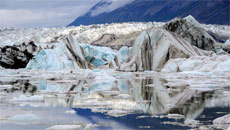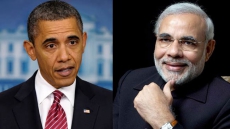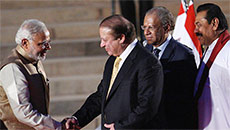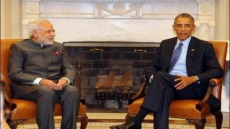US Defence Secretary Chuck Hagel Saturday said he is planning to visit India later this year to drive "transformational cooperation" with the country which is playing an "active role" in strengthening security in Asia.
Hagel, referring to India's growing defence capabilities, said the United States looked forward to working with the new Indian government led by Prime Minister Narendra Modi.
"We welcome India's increasingly active role in Asia's regional institutions, which strengthens regional order. We also welcome India's growing defence capabilities and its commitment to freedom of navigation in the Indian Ocean," Hagel said in a wide-ranging policy speech at an international security conference, the Shangri la dialogue, in Singapore.
To further strengthen US-India defence ties, he said he was directing the Pentagon's Undersecretary for Acquisition, Technology, and Logistics to lead the US-India Defence Trade and Technology Initiative with the Indian government.
"I plan to play an active and very personal role in expanding this initiative because it is a centrepiece of America's defence cooperation with India, and it should reflect the trust and confidence President Obama and I have in our nation's relationship with India."
"To reinforce this effort - and to drive even more transformational cooperation - I hope to visit India later this year," he said, describing India as "one of the United States' most important democratic partners - and a country with historic influence across Asia."
In the speech, Hagel also sought to reassure allies and partners who have doubts about the sincerity of the Obama administration towards its "rebalance" of military and diplomatic attention to the Asia-Pacific.
He said that US activity would increase and that US defence cuts would not come out of the region.
Across the Asia-Pacific region, US plans to increase foreign military financing in the region by 35 percent and military training and education by 40 percent by 2016, Hagel said.
"The United States also remains committed to building the capacity of allies and partners in the region through as many as 130 exercises and engagements, and approximately 700 port visits annually."
Next month, the US will host its annual Rim of the Pacific exercise, the world's largest maritime exercise that will feature for the first time a port visit by a New Zealand naval ship to Pearl Harbor in more than 30 years, and it will include Chinese ships for the first time.
RIMPAC will include some 23 nations, 49 surface ships, 6 submarines, more than 200 aircraft, 25,000 personnel and a few highly trained sea lions.
Hagel said the region will continue to receive some of the military's best aircraft and ships, including the new Zumwalt-class destroyer, by 2018.
He said a central premise of America's strategy in the Asia-Pacific is our recognition that, in the 21st century, no region holds more potential for growth, development and prosperity than this one.
Hagel highlighted four broad security priorities that the US is advancing in partnership with friends and allies throughout the Asia-Pacific:
First, encouraging the peaceful resolution of disputes; upholding principles including the freedom of navigation; standing firm against coercion, intimidation and aggression.
Second, building a cooperative regional architecture based on international rules and norms.
Third, enhancing the capabilities of our allies and partners to provide security for themselves and the region and,
Fourth, strengthening our own regional defence capabilities.
"Beyond capacity-building efforts, a stable and peaceful regional order depends on a strong American military presence across the Asia-Pacific region… a presence that enables us to partner with our friends and allies, and help deter aggression...Our interests lie in these partnerships and this region."





